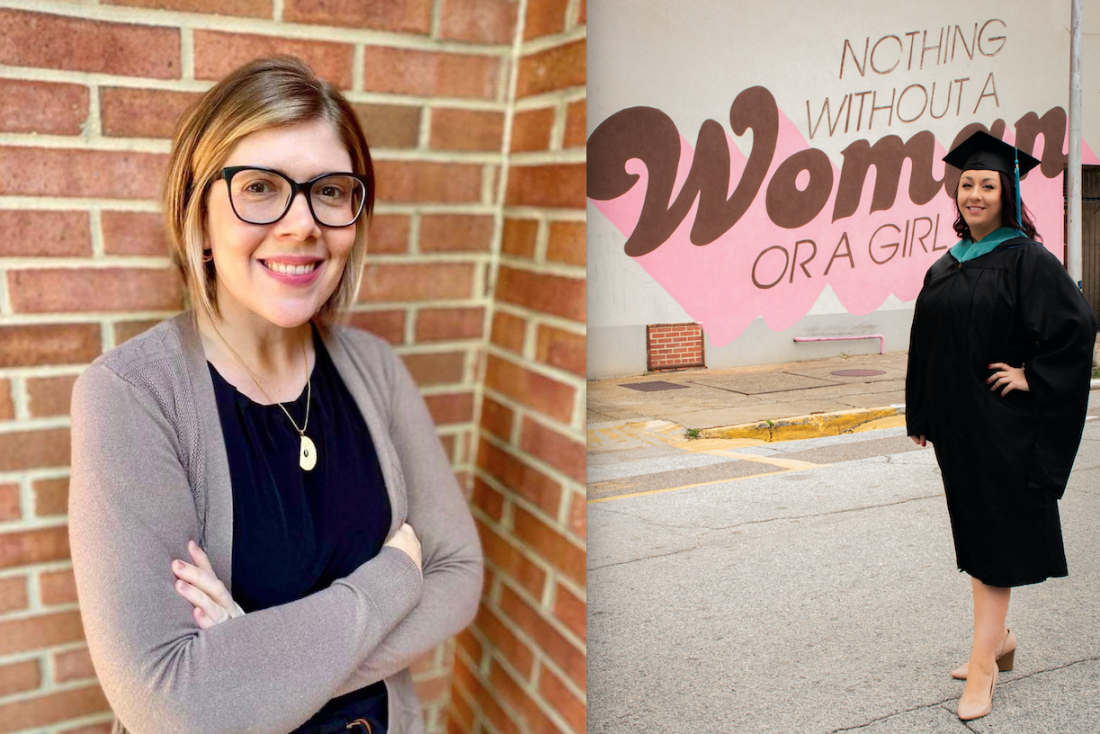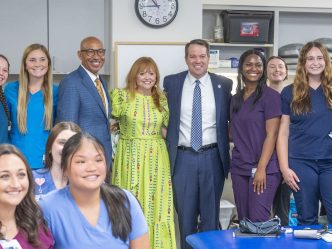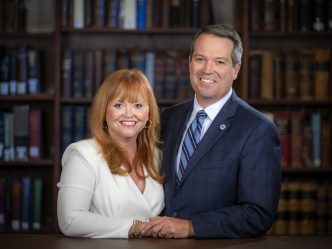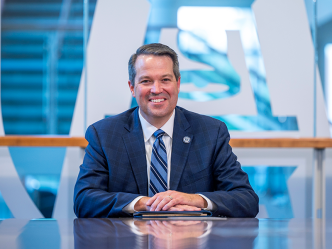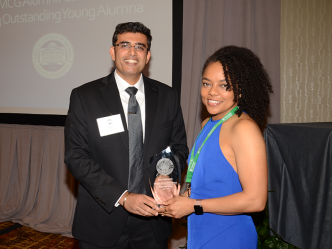Two recent graduates of the top-ranked Master of Public Administration program at Augusta University have not only earned their degrees this past year, but they have also secured $30,000 in grants for two local nonprofits.
MPA graduates Ashley Whitaker and Heather Henley wrote two separate grants as part of Augusta University’s public administration grant writing course taught by Kimberly Gray, DPA, an adjunct professor and the director of college assessment and strategic initiatives for Pamplin College of Arts, Humanities, and Social Sciences.
“The MPA program places a high value on students being able to have practical experiences,” said Wesley Meares, PhD, director of the Master of Public Administration program at Augusta University and an associate professor in the Department of Social Sciences. “The grant writing and administration course is one of many of our offerings where students have the opportunity to work with a community partner. We are very proud of Heather and Ashley. This is a great achievement.”
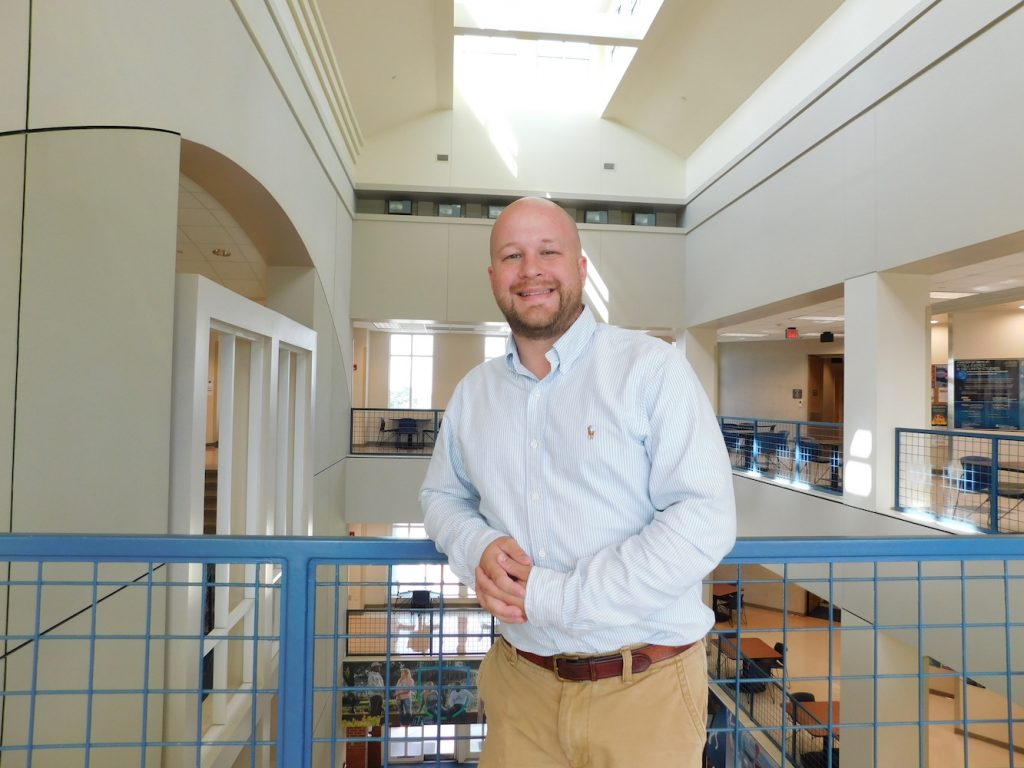

Whitaker, the former director of community resources at Shepeard Community Blood Center, wrote a grant application for the local blood center asking for funding to help bring awareness to sickle cell disease, a genetic blood disease that disproportionately affects Black Americans. Specifically, the grant request focused on the need for a more diverse blood supply and the promotion of the benefits of donating blood regularly.
Henley, a recent MPA graduate and the director of brand communications for Augusta University Communications & Marketing, wrote a grant to help fund The Augusta Players’ Camp Wonderland. This summer arts camp is designed specifically for the unique needs of children ages 7 to 21 who have Autism Spectrum Disorder (ASD). Entering its ninth year, the camp offers young people with ASD the opportunity to celebrate their creativity, bring their imaginations to life and learn to socialize and develop critical communication skills in a fun atmosphere.
In December, the Community Foundation for the Central Savannah River Area announced both Shepeard Community Blood Center and The Augusta Players’ Camp Wonderland will receive $15,000 each in 2023.
Recruiting more diverse blood donors
Whitaker, who is now the director of development for Junior Achievement in the greater Augusta area, said she was thrilled to learn Shepeard Community Blood Center won the $15,000 grant.
“It was amazing because the last thing I did at Shepeard before I accepted my new job was writing that grant, and to hear that it was funded was really rewarding,” Whitaker said. “It is an important grant because at Shepeard, we have the same predicament as many other nonprofit blood centers across the country — we don’t have a very diverse donor population.”
Less than 10% of the blood donors at Shepeard Community Blood Center are Black, Whitaker said.
“That is problematic for a lot of different reasons,” she said. “We’re based out of Richmond County and that donor population is not aligned to the population that we’re living in. And the reason why it’s important is because we supply Augusta University Health System and Piedmont Hospital with blood. But, specifically at Augusta University’s Medical College of Georgia, there is a Sickle Cell Center.”
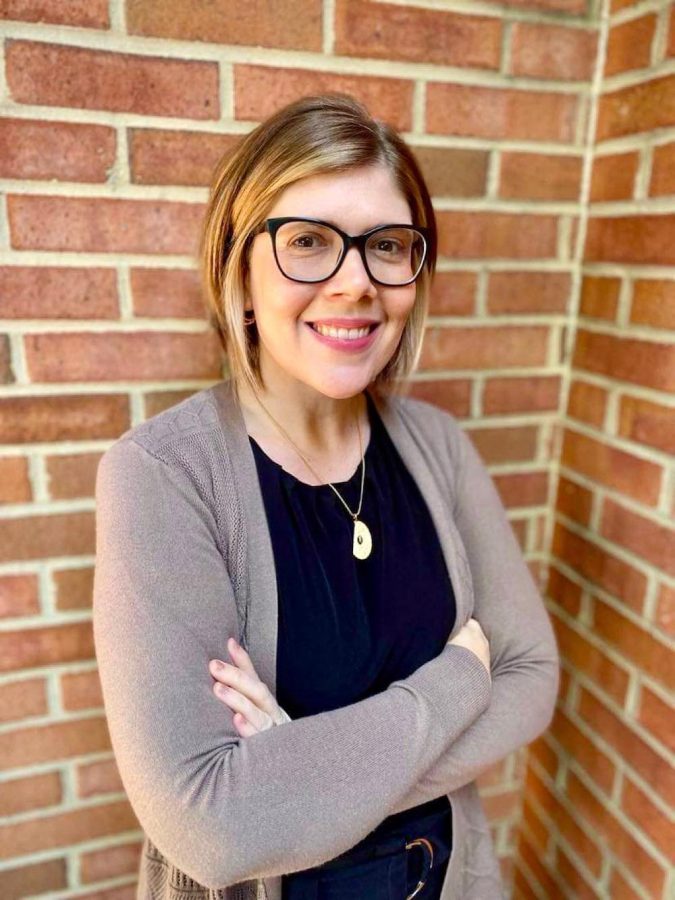

Sickle cell is the most common genetic blood disease in the United States and it affects as many as 100,000 people of various racial and ethnic backgrounds. The great majority of people living with sickle cell disease in the U.S. are Black, but Latinos make up the second largest group affected by sickle cell disease.
A single sickle cell patient can require multiple blood transfusions per year throughout their lifetime to treat complications from sickle cell disease. And these patients are more likely to find a compatible blood match from a donor of the same race or ethnic group, Whitaker said.
“Where it normally does not matter if you receive blood from someone who is not of the same ethnic background, when it comes to sickle cell treatment, it is really important,” Whitaker explained. “We want to make sure that we are matching the recipients with donors that have a similar background, so that blood type can be most effective for them. And since we do have such a small population of African American donors, we were having a really hard time giving the Sickle Cell Center the blood that they needed.
“Hopefully, this grant will help increase the population of African American donors through a series of blood drives, focus groups and educational seminars so that we can build trust within that community.”
Renita Carroll, the new director of community resources at Shepeard Community Blood Center, said she was elated when she learned the center would receive the $15,000 grant from the Community Foundation.
“The grant funding will allow us to increase education and awareness of sickle cell disease and the need for increased blood donation within the Black community,” she said. “It is important that the Black community is educated on the need for blood donation. Shepeard will host a focus group, educational forums and sickle cell blood drives throughout next year. If anyone is interested in more information regarding our initiative or would like to support us, please give us a call.”
Filling unique needs for arts enrichment
Henley, who learned about The Augusta Players’ Camp Wonderland through Gray’s grant writing class, said the $15,000 grant will support tuition assistance, student camp materials and staff stipends for the summer camp.
“Camp Wonderland is a valuable resource for youth in our community who may not be able to participate in traditional arts enrichment programs,” said Henley. “The stories from these families and volunteers served as inspiration to put all my efforts into securing the grant funding. After learning so many valuable skills from the MPA program, it was both challenging and exciting to put those skills to use and produce real-world results.”


Scott Seidl, executive and artistic director of The Augusta Players, said Camp Wonderland is the “heartbeat” of the organization.
“Camp Wonderland is the most important thing that we do every year,” Seidl said. “It takes about six months to plan and it happens across two weeks every summer. And it is so important to our organization that we never, ever turn anyone away from Camp Wonderland because of an inability to pay the fee to participate. The majority of participants in Camp Wonderland are on partial or full scholarships of some sort, so grant monies, individual donations and corporate donations really help make this program exist. Therefore, we were fortunate to be awarded this grant from the Community Foundation.”
With a staff of only two full-time employees and one part-time employee, Seidl said he was grateful for Henley’s offer to write the grant for The Augusta Players.
“As we are trying to grow and improve and create new programming, not only in terms of what we do on an annual basis, but looking down the road and building for a future, it was really helpful to have Heather take that load off of me for about six weeks that she worked on the grant,” Seidl said. “The fact that someone is reaching out to us was absolutely tremendous. We appreciated that greatly.”
The $15,000 grant will allow Camp Wonderland to be a continued success in 2023, Seidl said.
“There are 60 participants at Camp Wonderland and 30 of them are on the autism spectrum,” Seidl said. “And what is remarkable about this camp is campers are paired up one-to-one so every camper that is on the spectrum is paired with a buddy that is not on the spectrum. Many of the participants become best friends during the course of the camp.
“So, this camp is not only changing the lives of the autistic participants by making a huge difference in the development and communication skills, but it also improves the social awareness of the kids who are mainstream, most of whom tend to come from our Augusta Junior Players program,” he added. “It makes such a difference in how they see the world. In fact, many of those young people are now pursuing special education, or some form of it, as a career path because of their experience with Camp Wonderland.”
Along with the 60 campers, Camp Wonderland includes four arts teachers, four special education specialists, an autism specialist, a nurse, a program director and extra helpers in addition to The Augusta Players’ office staff.
“Across those two weeks, the participants go to a daily visual arts class, a movement class, a drama class and a music class,” Seidl said. “The way these classes are designed and taught are specific to the needs of the participants. So, for many of them, it is the only time during the entire year that they get to experience those kinds of creative classes.”
Throughout the two weeks, campers also have close interaction with both mainstream students and other campers on the spectrum, he said.
“There is a huge improvement in communication skills, behavioral skills and cognitive skills in just the span of a couple of weeks,” Seidl said. “On the final day of camp, they do a show-and-tell presentation for their family and friends of all the things that they have been working on the past couple of weeks. I go to that show and every year, I get choked up watching the growth and the joy and the creativity that comes out of these young people. It is remarkable to watch.”
The families of the students on the spectrum are in disbelief about their children’s achievements after the camp, he said.
“Parents of these young people are in awe at what they are witnessing because they never thought that their son or daughter would be able to express themselves and do the kinds of things that they are doing right there in front of them,” Seidl said. “It is just such an important part of what we do and it is such a joy to watch it every year. It truly is remarkable on all levels, so we are tremendously grateful for this grant.”
Making a difference
In total, the Community Foundation for the Central Savannah River Area awarded more than $906,000 this year in grant funding to nonprofits throughout the CSRA. Since 1997, community partners, most notably the Masters Tournament, have contributed to the Community Grants Fund, supporting the foundation in investing more than $12 million back into the community.
Gray said her students enjoy being a part of the grant application process with the Community Foundation because the nonprofits are so passionate about their causes.
“It makes me feel good that our students are helping the community,” Gray said. “Nonprofits are so vital to our community and the Community Foundation does a fabulous job with their community grants program.”
The public administration grant writing course is structured so that students begin by writing a pretend grant for a fake foundation to learn the basics of grant writing, Gray said.
“Next, I have all the students pick a nonprofit and they have to talk to them and figure out what it is they want to apply for,” she said. “Then, they work on the proposal and work with the nonprofit to get it submitted. They submit the grant writing for an assignment, but then I review it and give them feedback so they can improve the grant application before they actually submit it for consideration.”
When students learn their nonprofit has received the grant, they feel a major sense of accomplishment, Gray said.
“They are so excited. I always love getting these emails or phone calls saying, ‘I got my grant,’” Gray said. “It is important because many of our students in the MPA program may go on to be directors of nonprofit organizations and they are going to need to know how to write grants, or at least know the fundamentals of grant writing. It’s a crucial skill to have in those positions.”
Along with the MPA degree, Henley also completed Pamplin’s Certificate in Nonprofit Leadership.
“I hope to someday serve on a nonprofit board to continue making a difference in the community. Everything I learned in Augusta University’s MPA program will support my career and personal goals,” Henley said. “Along with grant writing, Dr. Gray also teaches an excellent course on leadership and ethics. Though many MPA grads work in city management or the nonprofit sector, I believe the program teaches skills that can be applied to any industry.”
Whitaker said Gray’s grant writing course was an invaluable experience.
“I firmly believe that Dr. Gray’s class was probably the most relevant class to my career and the most helpful. It was very applicable to what I was doing at the time at Shepeard and what I’m doing now at Junior Achievement,” Whitaker said. “It really does prepare you for a position in development or community resources at a nonprofit organization or any organization that is seeking funding because it is just a very hands-on class.
“Dr. Gray does a tremendous job conveying the information and making it relatable to the work you’ll be doing in your career,” she added. “I highly recommend her class.”
 Augusta University
Augusta University
